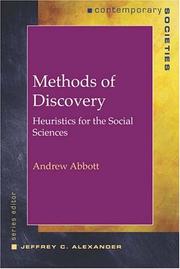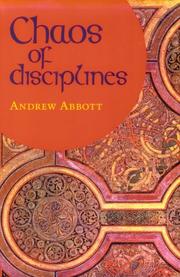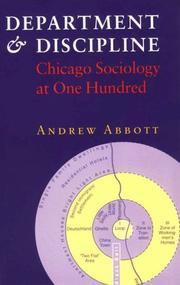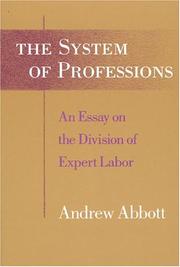| Listing 1 - 10 of 19 | << page >> |
Sort by
|

ISBN: 0393978141 9780393978148 Year: 2004 Publisher: New York, N.Y. Norton
Abstract | Keywords | Export | Availability | Bookmark
 Loading...
Loading...Choose an application
- Reference Manager
- EndNote
- RefWorks (Direct export to RefWorks)
Methods in social research (general) --- Social sciences --- Heuristic. --- Sciences sociales --- Heuristique --- Philosophy. --- Methodology. --- Philosophie --- Méthodologie --- #KVHA:Methodologie --- #KVHA:Wetenschappelijk onderzoek --- #KVHA:Research --- #KVHA:Sociale wetenschappen --- #KVHA:Heuristiek --- #SBIB:3 G --- #SBIB:303H0 --- Sociale Wetenschappen: algemeen --- Methoden in de sociale wetenschappen: algemeen --- Méthodologie --- Heuristic --- Social philosophy --- Social theory --- Methodology --- Philosophy --- Méthodologie Heuristique --- Méthodologie Heuristique
Book
ISBN: 9780226336596 9780226336626 022633659X 022633662X 9780226336763 022633676X Year: 2016 Publisher: Chicago : University of Chicago Press,
Abstract | Keywords | Export | Availability | Bookmark
 Loading...
Loading...Choose an application
- Reference Manager
- EndNote
- RefWorks (Direct export to RefWorks)
For the past twenty years, noted sociologist Andrew Abbott has been developing what he calls a processual ontology for social life. In this view, the social world is constantly changing-making, remaking, and unmaking itself, instant by instant. He argues that even the units of the social world-both individuals and entities-must be explained by these series of events rather than as enduring objects, fixed in time. This radical concept, which lies at the heart of the Chicago School of Sociology, provides a means for the disciplines of history and sociology to interact with and reflect on each other. In Processual Sociology, Abbott first examines the endurance of individuals and social groups through time and then goes on to consider the question of what this means for human nature. He looks at different approaches to the passing of social time and determination, all while examining the goal of social existence, weighing the concepts of individual outcome and social order. Abbott concludes by discussing core difficulties of the practice of social science as a moral activity, arguing that it is inescapably moral and therefore we must develop normative theories more sophisticated than our current naively political normativism. Ranging broadly across disciplines and methodologies, Processual Sociology breaks new ground in its search for conceptual foundations of a rigorously processual account of social life.
Social sciences --- Sociology --- Change --- Becoming (Philosophy) --- Ontology --- Philosophy. --- Social aspects. --- Moral and ethical aspects. --- Social theory --- Being --- Philosophy --- Metaphysics --- Necessity (Philosophy) --- Substance (Philosophy) --- Process philosophy --- Catastrophical, The --- Social philosophy --- 316.4 --- 316.4 Sociale processen --- Sociale processen --- Change. --- Social aspects --- Moral and ethical aspects --- Social sciences - Philosophy --- Sociology - Philosophy --- Change - Social aspects --- Becoming (Philosophy) - Social aspects --- Ontology - Social aspects --- Sociology - Moral and ethical aspects --- sociology, social world, chicago school, history, individuals, groups, human nature, time, determination, order, science, morality, normativism, nonfiction, becoming, ontology, ethics, excess, outcome, inequality, actor, sequence, ecology, causal reasoning, cause and effect, free will, scarcity, historiography, masses, reference.
Book
ISBN: 2722605457 2722605449 Year: 2020 Publisher: Paris : Collège de France,
Abstract | Keywords | Export | Availability | Bookmark
 Loading...
Loading...Choose an application
- Reference Manager
- EndNote
- RefWorks (Direct export to RefWorks)
Depuis que la sociologie s’est édifiée en discipline, la question de l’articulation entre pensée empirique et pensée normative – entre faits et valeurs – y occupe une place à la fois centrale et problématique. La multiplicité et la diversité des « ontologies » semblent en effet n’avoir offert aucune perspective totalement satisfaisante, laissant cette question en suspens. D’Émile Durkheim à Max Weber, Andrew Abbott revisite les théories classiques qui se sont construites en réaction au dualisme kantien des trois Critiques, pour poser les jalons de sa propre théorie du processus social. Il tente ainsi de dépasser l’opposition stricte entre le monde des faits et celui des possibilités et des valeurs : entre l’historicisme (Karl Marx) et les thèses du droit naturel et de l’économie scientifique (Alfred Marshall). Au fil d’une réflexion ponctuée d’exemples concrets et de métaphores éclairantes, les fondements d’un nouveau « processualisme » se dessinent peu à peu. Cette approche du monde social prône l’instauration d’un dialogue dynamique entre faits et valeurs – entre passé et futur – pour saisir le flux des processus historiques qui interagissent en permanence au sein d’un présent « épais ».
Philosophy --- Social Sciences, Interdisciplinary --- Sociology --- sociologie --- processualisme --- faits --- valeurs
Book
ISBN: 9780226167640 9780226167787 9780226167817 022616764X 022616778X Year: 2014 Volume: *10 Publisher: Chicago : The University of Chicago Press,
Abstract | Keywords | Export | Availability | Bookmark
 Loading...
Loading...Choose an application
- Reference Manager
- EndNote
- RefWorks (Direct export to RefWorks)
Today’s researchers have access to more information than ever before. Yet the new material is both overwhelming in quantity and variable in quality. How can scholars survive these twin problems and produce groundbreaking research using the physical and electronic resources available in the modern university research library? In Digital Paper, Andrew Abbott provides some much-needed answers to that question.Abbott tells what every senior researcher knows: that research is not a mechanical, linear process, but a thoughtful and adventurous journey through a nonlinear world. He breaks library research down into seven basic and simultaneous tasks: design, search, scanning/browsing, reading, analyzing, filing, and writing. He moves the reader through the phases of research, from confusion to organization, from vague idea to polished result. He teaches how to evaluate data and prior research; how to follow a trail to elusive treasures; how to organize a project; when to start over; when to ask for help. He shows how an understanding of scholarly values, a commitment to hard work, and the flexibility to change direction combine to enable the researcher to turn a daunting mass of found material into an effective paper or thesis.More than a mere how-to manual, Abbott’s guidebook helps teach good habits for acquiring knowledge, the foundation of knowledge worth knowing. Those looking for ten easy steps to a perfect paper may want to look elsewhere. But serious scholars, who want their work to stand the test of time, will appreciate Abbott’s unique, forthright approach and relish every page of Digital Paper.
Science --- Computer architecture. Operating systems --- Documentation and information --- Report writing --- Research --- Searching, Bibliographical --- Rapports --- Recherche --- Recherche documentaire --- Handbooks, manuals, etc. --- Rédaction --- Guides, manuels, etc --- Guides, manuels, etc. --- Rédaction scientifique et technique --- Rédaction de rapports, notes et comptes rendus --- Bibliographical searching --- Libraries --- Information retrieval --- Rédaction --- Rédaction scientifique et technique --- Rédaction de rapports, notes et comptes rendus

ISBN: 0226001024 0226001032 9780226001036 Year: 2001 Publisher: Chicago (Ill.): University of Chicago press,
Abstract | Keywords | Export | Availability | Bookmark
 Loading...
Loading...Choose an application
- Reference Manager
- EndNote
- RefWorks (Direct export to RefWorks)
Sociological theories --- Sociological theory building --- Sociology --- Time --- Sociologie --- Temps --- Methodology. --- Philosophy. --- Sociological aspects. --- Méthodologie --- Philosophie --- Aspect sociologique --- Methodology --- Philosophy --- Sociological aspects --- #PBIB:2003.1 --- Méthodologie --- Sociology of time --- Sociology - Methodology --- Sociology - Philosophy --- Time - Sociological aspects --- Sciences sociales

ISBN: 0226001008 0226001016 9780226001012 Year: 2001 Publisher: Chicago (Ill.): University of Chicago press,
Abstract | Keywords | Export | Availability | Bookmark
 Loading...
Loading...Choose an application
- Reference Manager
- EndNote
- RefWorks (Direct export to RefWorks)
Sociological theories --- Sociology --- Social sciences --- Sociologie --- Sciences sociales --- Philosophy. --- Philosophie --- Philosophie sociale --- Sociologie et philosophie --- #SBIB:316.23H1 --- #SBIB:3 G --- Social philosophy --- Social theory --- Kennissociologie --- Sociale Wetenschappen: algemeen --- Philosophy --- Philosophie sociale. --- Sociologie et philosophie. --- Sociology - Philosophy --- Social sciences - Philosophy

ISBN: 0226000982 0226000990 9780226000985 9780226000992 Year: 1999 Publisher: Chicago: University of Chicago press,
Abstract | Keywords | Export | Availability | Bookmark
 Loading...
Loading...Choose an application
- Reference Manager
- EndNote
- RefWorks (Direct export to RefWorks)
"In this detailed history of the Chicago School of Sociology, Andrew Abbott investigates central topics in the emergence of modern scholarship, paying special attention to "schools of science" and how such schools reproduce themselves over time. What are the preconditions from which schools arise? Do they exist as rigid rules or as flexible structures? How do they emerge from the day-to-day activities of academic life such as editing journals and writing papers? Abbott analyzes the shifts in social scientific inquiry and discloses the intellectual rivalry and faculty politics that characterized different stages of the Chicago School. Along the way, he traces the rich history of the discipline's main journal, the American Journal of Sociology. Embedded in this analysis of the school and its practices is a broader theoretical argument, which Abbott uses to redefine social objects as a sequence of interconnected events rather than as fixed entities. Abbott's theories grow directly out of the Chicago School's insistence that social life be located in time and place, a tradition that has been at the heart of the school since its founding one hundred years ago"--Book cover.
Sociological theories --- Chicago school of sociology --- Sociology --- Ecole de Chicago (Sociologie) --- Sociologie --- History. --- Periodicals --- Histoire --- Périodiques --- University of Chicago. --- American journal of sociology --- History --- Universities --- Social theory --- Social sciences --- Chicago sociologists --- Schools of sociology --- history. --- Chicago. --- University of Chicago --- #SBIB:316.20H16 --- Grondleggers van de sociologie: U.S.A. --- Périodiques --- Periodicals&delete& --- history --- Grondleggers van de sociologie: U.S.A --- Chicago school of sociology - History --- Sociology - United States - History --- Sociology - United States - Periodicals - History --- Sociology - Illinois - Chicago - History --- University of Chicago. Department of sociology --- American Journal of sociology (périodique) --- École de Chicago (sociologie) --- États-Unis --- Chicago (Ill.) --- 20e siècle --- American Journal of sociology (périodique) --- École de Chicago (sociologie) --- États-Unis --- 20e siècle

ISBN: 9780226000695 0226000699 0226000680 9780226000688 Year: 1988 Publisher: Chicago: University of Chicago press,
Abstract | Keywords | Export | Availability | Bookmark
 Loading...
Loading...Choose an application
- Reference Manager
- EndNote
- RefWorks (Direct export to RefWorks)
In 'The System of Professions' Andrew Abbott explores central questions about the role of professions in modern life: Why should there be occupational groups controlling expert knowledge? Where and why did groups such as law and medicine achieve their power? Will professionalism spread throughout the occupational world? While most inquiries in this field study one profession at a time, Abbott here considers the system of professions as a whole. Through comparative and historical study of the professions in nineteenth- and twentieth-century England, France, and America, Abbott builds a general theory of how and why professionals evolve.
Sociology of occupations --- Professions libérales --- -Professions --- -#SBIB:316.334.2A70 --- Career patterns --- Jobs --- Professional services --- Interprofessional relations --- Professions --- #SBIB:316.334.2A70 --- 316:34 --- 316:34 Rechtssociologie --- Rechtssociologie --- Careers --- Occupations --- Vocational guidance --- Beroepensociologie: algemeen, middenstand, vrije beroepen --- Sociology of law --- Professions libérales --- Professions - United States --- Professions - Great Britain --- Professions - Europe --- Relations intergroupes --- Europe --- États-Unis --- Grande-Bretagne --- États-Unis
Book
ISBN: 1351490478 1351490486 9781351490481 9781351490474 9781412810920 Year: 2017 Publisher: London, [England] ; New York, New York : Routledge,
Abstract | Keywords | Export | Availability | Bookmark
 Loading...
Loading...Choose an application
- Reference Manager
- EndNote
- RefWorks (Direct export to RefWorks)
Social change. --- Social institutions. --- United States --- Social conditions --- Politics and government
Book
ISBN: 9782722605442 Year: 2020 Publisher: Paris : Collège de France éditions,
Abstract | Keywords | Export | Availability | Bookmark
 Loading...
Loading...Choose an application
- Reference Manager
- EndNote
- RefWorks (Direct export to RefWorks)
Depuis que la sociologie s’est édifiée en discipline, la question de l’articulation entre pensée empirique et pensée normative – entre faits et valeurs – y occupe une place à la fois centrale et problématique. La multiplicité et la diversité des «ontologies» semblent en effet n’avoir offert aucune perspective totalement satisfaisante, laissant cette question en suspens. D’Émile Durkheim à Max Weber, Andrew Abbott revisite les théories classiques qui se sont construites en réaction au dualisme kantien des trois "Critiques", pour poser les jalons de sa propre théorie du processus social. Il tente ainsi de dépasser l’opposition stricte entre le monde des faits et celui des possibilités et des valeurs : entre l’historicisme (Karl Marx) et les thèses du droit naturel et de l’économie scientifique (Alfred Marshall). Au fil d’une réflexion ponctuée d’exemples concrets et de métaphores éclairantes, les fondements d’un nouveau « processualisme » se dessinent peu à peu. Cette approche du monde social prône l’instauration d’un dialogue dynamique entre faits et valeurs – entre passé et futur – pour saisir le flux des processus historiques qui interagissent en permanence au sein d’un présent « épais ».
| Listing 1 - 10 of 19 | << page >> |
Sort by
|

 Search
Search Feedback
Feedback About UniCat
About UniCat  Help
Help News
News